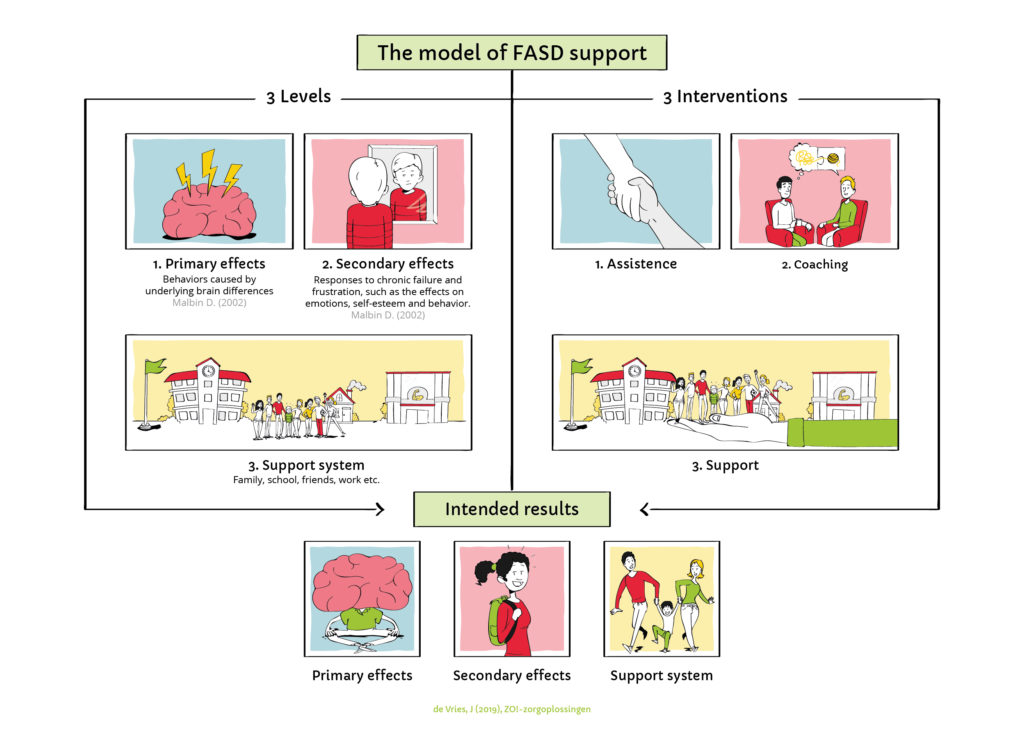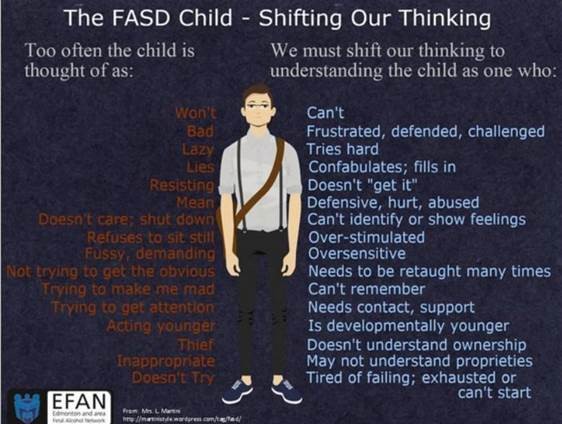FASD Support
FASD affects almost all aspects of life and development. At ZO! we promote the importance of gaining a life that is as normal as possible, even in case of problems or a disability by the FASD-Education-Treatment-Coordination-Program. This program is suitable for Sentinel physical finding / Statie Encephalopathy, Alcohol exposure unknown, as well.
During the FASD-Education-Treatment-Coordination-Program we profide caregivers, siblings, family, school and all others involed with knowlegde about FASD, give treatment and/of coordinate treatment of others. We work together finetuning the daily routines, education and activities to optimize development. The program runs for a year and can be extended if needed. During the program we try to educate local caregivers, so they can continue when we stop.
The program provides
– knowledge about FASD or Sentinel physical finding / Statie Encephalopathy, Alcohol exposure unknown;
– knowledge and tools how to support the development and how to handel behavior related to FASD in daily life;
– coaching for parents, youth with FASD and others in implementing knowledge and tools during a longer period of time.
-psychological and psychiatric treatments if needed. Coordination other treatments.
– building a supportive network for the family.
-reducing parental stress.
We developed The model of FASD support. With this model we provide understanding and care for the person with FASD and his of her environment, to optimize development and compensate for problems caused by FASD.
To understand the functioning of a person with FASD we need to realize that a lot of problems are caused by the underlying defects in the central nervous system. Although problems may look like ADHD, ASS or RAD, they have a different cause. Therefore, the approach differs as well.

The primary effects of FASD
These are the problems caused directly by the defects in the central nervous system itself. The person with FASD can have different levels of functioning and levels of functioning vary over time. This is often referred to as a motivational or attitude problem, but is a direct effect of the defect in the central nervous system.
The secondary effects of FASD
These are the problems caused by the primary effects. The failures, problems and difficulties affects emotions, self-esteem and behavior. For example, repeated failures gives low self-esteem and a tendency to avoid new situations.
The support system of FASD
This is the environment where the person with FASD lives, his or her family, relations and activities. Throughout this environment the effects of FASD are visible. These effects can also be invisible whereby a person with FASD achieves a lot in one situation but pays the price in another by being exhausted or having a behavioral u meltdown at home.
The model of FASD support
In The model of FASD support we focus on three levels. All three levels need their own support.
The primary effects needs assistance
Although people with FASD have possibilities and will develop, there will be limitations over time. As caregivers, teachers and health care professionals we want to train and improve behavior and development. FASD is a disability and a disability needs assistance instead of training.
This is the brain-based aspect of the model and requires knowledge and experience of FASD. The limitations need assistance for successful functioning. Trying to solve something which can’t be solved leads to frustration. It evokes more secondary problems and is a waste of energy for everyone.

The secondary effects needs coaching
The secondary effects can be reduced by providing coaching and treatment, such as psycho-education and working together to achieve the next skills that are possible.
For understanding when to assist and when to coach, knowledge of FASD is required. Every person with FASD differs and is in need of a personalized approach.
The support system needs support
The saying goes; “it takes a village to raise a child”, even more so in the case of FASD. The complete environment needs support to support the person with FASD. It helps to get FASD information and tools, parent network groups, psycho-education for schools, friends and families etc.
This is also the brain-based aspect of the model and requires knowledge and experience of FASD.
FASD and treatment of attachment
A person with FASD can have other problems as well, such as an attachment disorder or trauma. This requires a specialized assessment, because behavior caused by FASD can also present as another disorder.
At ZO! we promote attachment-based treatment and trauma treatment in case of an attachment or trauma disorder, in addition to The model of FASD support. People with FASD have to rely on others even more than people without FASD because of the support they need. Everything we can do to repair trust in others will be helpful for their future.
FASD and treatment of other problems
In the same way, other treatments can be necessary and possible and be added to The model of FASD support. In all situations knowledge of FASD is required because outcomes will be different than in other treatments. FASD is always in the background.
More information; EU FASD.

 FASD
FASD Attachment disorder
Attachment disorder Differentiation therapy & PHASE therapy
Differentiation therapy & PHASE therapy Adoption support
Adoption support Therapeutic Parenting
Therapeutic Parenting CONNECT parentgroup The Netherlands
CONNECT parentgroup The Netherlands